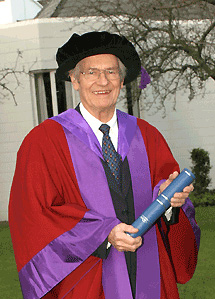In Memoriam - Clark Brundin
The University is deeply saddened by news of the death of former Vice-Chancellor Dr Clark Brundin who has passed away peacefully aged 90. Clark was Vice-Chancellor at Warwick from 1985 to 1992.
His impact on Warwick
His seven-year term at Warwick saw unprecedented success and expansion, with student numbers doubling and extensive building taking place. Our widening participation and lifelong learning activities flourished with the launch of part-time degree programmes and 2+2 degrees.
Clark was instrumental in launching the Warwick Graduates' Association and became its first Honorary President, saying that he hoped it would be the start of a long and fruitful relationship between the University and its graduates, which has proven to be the case.
He also presided over the celebration of Warwick’s twenty-fifth anniversary, which were carried out with style and with panache.
In January 2004, Clark was awarded an honorary degree from Warwick.
Cooperation with industry
Clark encouraged Warwick to cooperate with industry and in this period the Warwick Manufacturing Group (WMG), Warwick Business School and many other areas of University activity developed significant links.
In 1990 the University received the prestigious international Bertelsmann prize for combining academic excellence and the imaginative generation of revenue ''in an exemplary fashion”.
Internationalisation
As a US citizen Clark personified Warwick’s approach to be truly international, teaching students with a global mindset, and undertaking research that addressed global problems and issues. Clark’s commitment was particularly evident when he travelled to Germany to receive the Bertelsmann prize- when he immediately used that used the prize money to fund scholarships for students from the newly democratic East European countries. In October 1991, this saw 15 East European scholars - postgraduates from Hungary, Czechoslovakia, Poland and Romania - come to Warwick.
Campus developments
Buildings for Psychology and Biotechnology were constructed and the Advanced Technology Centre was built and opened by then Prime Minister Margaret Thatcher.
Social Studies was also extended to house Warwick Business School, with significant additions made to this building and the University Arts Centre, and a series of post-experience centres, pioneering buildings for the University community in the UK, were opened.
A new standard was set in student accommodation with Jack Martin and Arthur Vick Residences being built with single rooms and en-suite facilities.
The Mead Gallery, the University's art gallery, was opened and the monumental Richard Deacon sculpture entitled Let's Not Be Stupid presented to us by the Nyda and Oliver Prenn Foundation. It is perhaps the most significant commission of a work of sculpture by a British university in the twentieth century.
The campus was developed with the creation of two more lakes and significant planting of trees, becoming a haven for wildlife.
Academic reputation
It was during Clark’s tenure as Vice-Chancellor that data first emerged that showed that in just 25 years since its birth Warwick had soared past much older universities in its research performance. The scores of the first “Research Assessment Exercise” in 1986, 1989 and 1992 showed Warwick firmly in the top ten of the UK’s research universities.
Other works and achievements
Prior to joining Warwick, Clark’s time at Oxford University culminated in appointment as Vice-Chair of the General Board of the Faculties. In this role he developed a reputation for the interpersonal skills and diplomacy that attracted him to the appointing panel for Warwick's Vice-Chancellor in 1985.
On leaving Warwick, Clark took up the roles of President of Templeton College and Director of Oxford’s School of Management Studies (1992-96) and was later made an Honorary Fellow of the establishment. He was a Visiting Scholar at the Centre for Higher Education Studies, Berkeley, University of California, served on the advisory board of the Oxford Centre for Higher Education Policy Studies and also sat as a Liberal Democrat Councillor on Oxford City Council.
There is no doubt that the period of the late 80s and early 90s laid the ground work for the success of Warwick in the subsequent decades and we have Clark, amongst others, to thank for this. Our thoughts are with his family and friends at this sad time.

